Why the doctor of Lampedusa changed jobs
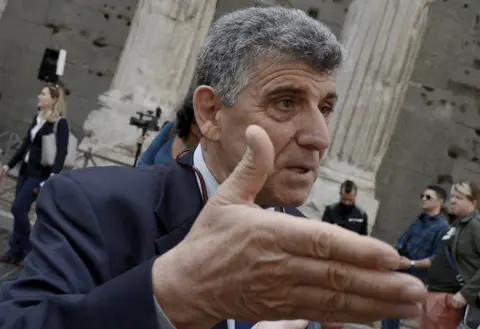 Getty Images
Getty ImagesThree years ago Pietro Bartolo, sometimes known as the doctor of Lampedusa, was working round the clock to treat migrants landing on the Mediterranean island. Now he is tackling the same problem but in a different way, reports the BBC's Emma Jane Kirby.
Dr Pietro Bartolo blinks at me from the top of the hot, bleached staircase that leads up to his apartment. He kneads his knuckles into his eyes a few times as though trying to untangle himself from the comforting clutches of Morpheus's arms. I apologise for waking him and he protests feebly that he hasn't been sleeping, just resting a little. As he makes his way slowly down the stairs, I see him fiddling with his mobile phone, switching the sound back on. By the time he reaches me in the lobby, his phone is ringing.
"Pronto?" he says wearily, tucking the mobile under his ear and offering me his right hand. "No, no," he protests to whoever is on the phone, "I wasn't asleep I was just… there was a problem with the mobile. Anyway, what can I do for you?"
When I first met Pietro Bartolo three years ago at Lampedusa's hospital, he looked completely exhausted.
He was completely exhausted. He had been suffering from a fever and had not gone to bed that night as two migrant boats had arrived in the dark hours and he'd been called out to tend to sick passengers.
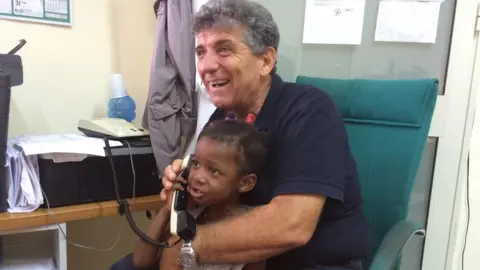
I remember that during our interview his mobile phone and his desk phone never stopped ringing. And I remember him hurling his fax machine against the wall in frustration to stop its incessant, impatient beeping. But when a newly rescued giggling four-year-old girl from Mali burst through his office door and climbed into his lap for a cuddle, I can also recall how he threw back his head in delight and told me this was why he did his job, this was why it was worth the exhaustion.
Bartolo isn't Lampedusa's doctor any more. He can't be Lampedusa's doctor any more, he tells me, with his eyes fixed firmly on the pavement, because what has he changed as Lampedusa's doctor? For 30 years, he reminds me, he's been visiting migrants, meeting every landing, treating the sick and injured, performing autopsies on those who didn't make it.
"But nothing changes," he says looking up at me with his heavy-lidded eyes that are circled with dark, bruised shadows.
"I've written books, taken part in documentary films, what more can I do? Nothing changes.
"So that's why I've gone to Brussels. Maybe from there I can change things."
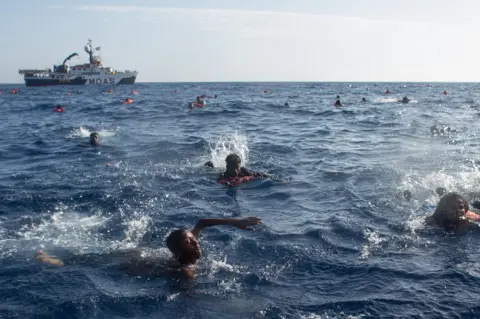 Getty Images
Getty ImagesDr Bartolo has exchanged medicine for politics. In March this year he was elected as a member of the European parliament.
He is proud he says to have been invited to be part of a working party tasked with reforming the Dublin Regulation, an EU law that determines which EU member state is responsible for dealing with a migrant's application for asylum.
Sometimes, as we talk, he dives into the opaque lingua franca of Strasbourg and Brussels - directives, recommendations and binding legislative acts. Then, quite suddenly he surfaces, returning to plain Italian/English.
"How is it possible," he snarls, "that it's becoming a crime to save someone at sea?"

Find out more
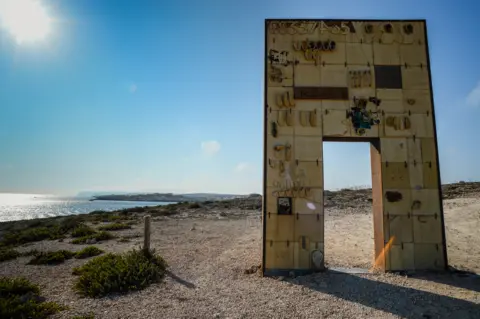 Getty Images
Getty ImagesListen to Emma Jane Kirby's reports from Lampedusa for PM, on BBC Radio 4, at 17:00 on Monday, Tuesday and Wednesday

Italy's populist Deputy Prime Minister, Matteo Salvini, has banned civilian or NGO search and rescue ships - and recently even the Italian coastguard - from docking at Italian ports if they are carrying asylum seekers. Salvini believes rescued migrants should simply be returned to Libya, pointing out that under current EU rules, if migrants disembark on Italian soil, it will be up to Italy to process the passengers' asylum claims. And why, he asks, should Italy serve as Europe's refugee camp?
"But more people are dying!" argues Bartolo, tightly squeezing his mobile in his right fist. "More people than ever."
In 2017, one out of every 41 people attempting to make the perilous Mediterranean crossing from North Africa to Italy drowned on route. Today fewer people are making the journey, but with limited search and rescue facilities as many as one in six are dying at sea, according to the UN refugee agency.
"This violates all human rights, our constitution and international law," snaps Bartolo, thumping his phone into his thigh. "It's our duty to save lives - but today it's becoming a crime?"
A few metres up from Bartolo's house, the parish church of Lampedusa offers some calming respite from the unpitying sun. Hanging over the altar, Christ is crucified on a stark cross made out of the rotten oars from shipwrecked migrant boats; it was a gift from Pope Francis to thank parishioners for the humanitarian work they do to help desperate migrants who land on the island.
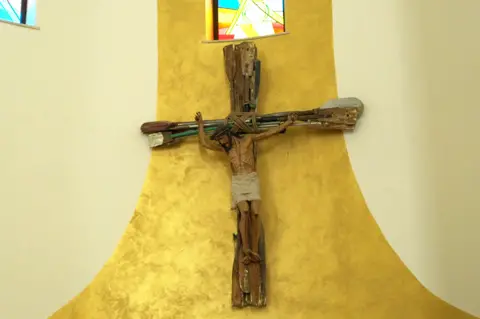
But in the European elections last Spring, Salvini's right-wing nationalist League party came first in Lampedusa.
Pietro Bartolo is close to tears when he tells me how homesick he is in Brussels and what a wrench it's been to leave his island and his calling. He returns as often as he can.
"But here I only see suffering!" he protests. "I can't make it change!"
He holds his head in his hands.
"When I've solved the problem, I'll come back here," he says with forced determination, staring at the kerb. "I'll be the doctor of Lampedusa again. Because once a doctor always a doctor."
His mobile phone begins to vibrate in his hand and he clears his throat.
"Pronto?" says MEP Pietro Bartolo, in a different voice.
You may also be interested in:
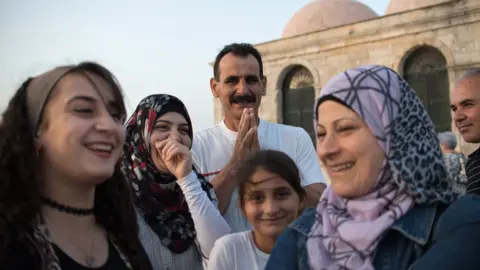
When a Syrian stonemason and his family were granted asylum in Greece in 2017 they immediately made their way to the island of Crete - completing a journey begun by their great-grandparents 130 years ago.
